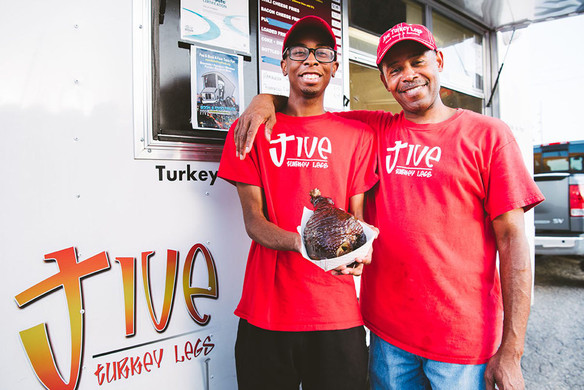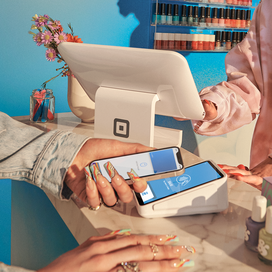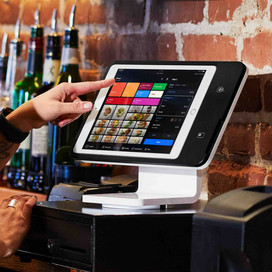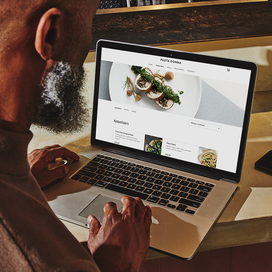Table of contents
The popularity of food trucks has exploded in the past decade: What began as a fad has gone mainstream as Americans have embraced mobile restaurants. As a result, aspiring chefs and restaurant-industry entrepreneurs have turned to food trucks as a lower-cost, lower-risk alternative to opening traditional restaurants.
However, it’s crucial for aspiring entrepreneurs to know about potential food truck costs before making the financial commitment. And, of course, one of the most important questions is simple: How much does it cost to start a food truck?
Perhaps the most attractive aspect of starting a food truck instead of (or as a precursor to) a brick-and-mortar restaurant is the idea that it’s a relative bargain. But your actual food truck startup costs might be more than you expect, especially depending on where you live.
How much does it cost to start a food truck? Consider these essentials
So, how much does it cost to start a food truck? The answer depends on a lot of factors such as your location, whether you rent or buy a truck, what kind of menu you’re offering, and the type of equipment you need. But no matter where you start, some expenses are almost always part of the equation. Here’s a snapshot of food truck costs.
Average food truck startup costs in the U.S.
|
Startup item |
Estimated costs |
|
Food truck |
$40,000–$150,000 |
|
Licenses and permits |
$1,864–$28,276 |
|
Startup inventory |
$2,000–$3,000 |
|
Serveware |
$300 |
|
Fuel and maintenance |
$500–$1,000 |
|
Insurance |
Varies by policy |
Every food truck business is different, so your total costs will vary depending on your choices. For example, if you intend to rent a truck instead of buying it, your initial food truck startup costs may be lower. But this overview gives you a starting point for building your food truck budget. Let’s take a closer look at the costs, so you can see exactly what to expect and how to plan for it.
Licenses and permits are a large part of your food truck startup costs
To start a food truck and operate for one year, an entrepreneur spends an average of $28,276 on permits, licenses, and legal compliance, according to the U.S. Chamber of Commerce’s Food Truck Index.
The types of permits and licenses required to operate a food truck fall under five categories: administrative, health/menu/food safety, vehicle requirements and safety/hazard prevention, employment, and zoning.
Here are some of the most common permits and licenses food truck owners typically need:
-
Business license: This is the basic license that allows you to operate legally within your city or county. It’s often the first step in setting up any kind of business, food truck or otherwise.
-
Employer Identification Number (EIN): Issued by the Internal Revenue Service (IRS), an EIN is used to identify your business for tax purposes. You’ll need it to open a business bank account, hire employees, or apply for certain permits.
-
Driver’s license: If you’re planning to drive the truck yourself, you’ll need a valid driver’s license — and in some areas, a commercial driver’s license (CDL) may be required, depending on the size and weight of the vehicle.
-
Food handler’s permit: This shows that you (and your staff) understand safe food handling practices. In most states, at least one person on the truck must have a valid food handler’s card at all times.
-
Health department permit: This is your go-ahead from the local health department to prepare and sell food to the public. Your truck will typically need to pass a health inspection before this permit is issued and procedures vary by city.
-
Vehicle insurance: You’ll need insurance that covers both the truck and the business operations inside it. General liability, collision, and commercial auto coverage are all worth considering.
-
Parking permit: Some cities require a special permit to legally park and operate your food truck in public areas. Others limit where and when you can vend, so check local ordinances carefully.
-
Commissary kitchen requirements: In many cities, food trucks are required to prep and store food in a licensed commissary kitchen — a commercial facility that meets local health and safety codes. Health departments often need proof of a commissary agreement before issuing a permit, especially if your truck lacks on-board storage or sanitation systems.
The location of your food truck matters
The process and cost of starting a food truck varies by location. According to the U.S. Chamber of Commerce’s Food Truck Index, some cities have made it relatively easy and affordable to get started, while others require more steps, higher fees, or both.
The report lists the five cities friendliest to food trucks as Portland (Oregon), Denver, Orlando, Philadelphia, and Indianapolis. The five toughest are Boston, Washington, D.C., San Francisco, Minneapolis, and Seattle. The ranking is based on how easy or difficult it is to fulfill local requirements related to obtaining permits and licenses, complying with restrictions, and operating a food truck.
When it comes to fees, Indianapolis has the lowest fees at $590, while Boston comes in at $17,066 (Seattle has the next highest fees at $6,211). Boston is an outlier with its extra-high fees, so if you remove it from the equation and calculate the average permit and license costs of the other top 19 food truck cities, you find that the average fees paid by food truck operators are about $1,864.
In food trucks, as in real estate, location is everything. So if you’re trying to decide where to start your food truck, think critically about whether your city’s permit and licensing fees — on top of all the other costs associated with your business — are cost prohibitive.
The cost of renting versus buying a food truck
Perhaps the biggest (and priciest) question new food truck entrepreneurs face is whether to rent or buy their vehicle. And this will deeply affect food truck costs. Each option comes with its own set of trade-offs — especially when you consider upfront costs, flexibility, and long-term value.
Buying a new food truck
A brand-new, made-to-order food truck typically costs between $75,000 and $150,000, according to The Restaurant Store. These trucks are designed from the ground up to match your specific layout, menu, and branding needs. You’ll have full control over the equipment and flow of the kitchen, which can pay off operationally in the long run. However, custom builds often take several months to complete, and you’ll need to budget for permits, wrap/branding, and potential delays.
Buying a used food truck
Used food trucks are generally more affordable, ranging from $40,000 to $80,000, based on marketplace listings. Many come partially or fully outfitted, so you can start using them almost immediately. Still, there may be hidden costs — like repairs, outdated equipment, or retrofitting the truck to meet local health codes. It’s a good idea to have a used truck professionally inspected before making a purchase.
Renting a food truck
Renting offers the lowest barrier to entry. The cost of renting a food truck depends on the length of the lease, but if it’s longer than, say, six months or more, it should be around $2,000 to $3,000 per month. For short-term use or testing your concept before a major investment, this option can make sense. Just remember: you won’t own the asset, and customization is usually limited. Over time, monthly rental fees can add up to the cost of buying, without the long-term value.
Should you rent or buy? Here’s a side-by-side comparison
|
Buy (New or Used) |
Rent |
|
|
Upfront cost |
High (especially for new trucks) |
Lower |
|
Monthly cost |
None (after purchase) |
$2,000–$3,000/month |
|
Custom options |
Full control (especially with new builds) |
Limited or none |
|
Speed to launch |
Used: Fast New: Can take months |
Fast |
|
Long-term value |
Builds equity; can be resold |
No equity |
|
Maintenance |
Your responsibility |
May be covered by rental company |
|
Best for |
Long-term operations with clear business plan |
Short-term testing, events, or early-stage trials |
Additional food truck startup costs that can add up quickly
Obtaining a truck itself is the most expensive item in your food truck startup costs, followed by fees and permits. However, there are a number of additional costs to consider before you can serve your first customer.
Necessary kitchen equipment
The type of equipment you need depends on the type of food you serve, but common appliances are ovens, fryers, grills, and refrigerators. Other equipment may include pots and pans, storage containers, knives, serving implements, and other utensils. Appliances can cost well into the thousands, and supplies like pots, pans, and other tools can cost a few thousand dollars.
When you’re launching your business and dealing with lots of other food truck costs, it might make more sense for you to lease appliances while you figure out what you really need and build up the capital to reinvest in your food truck.
Inventory needed to get off the ground
The basic materials you need to launch your food truck include ingredients for your menu items and serveware like plates, cups, lids, utensils, and napkins. Generally, your food truck startup costs for ingredients depend on your menu, but expect to spend around $1,000 to $2,000 when you take into account items like cooking oil, spices, and more. Serveware startup costs for food trucks are around $300.
Operational costs of a food truck
The greatest food truck costs associated with running your business have nothing to do with the food. Gas, insurance (auto liability, general liability, workers’ compensation, etc.), permits, licenses, maintenance, equipment, and supplies are all major considerations when creating a budget and figuring out how you’ll turn a profit.
As noted above, the average cost of permits and licenses in the top 19 food truck cities is $1,864. Fuel and maintenance costs vary, but average around $500 and $1,000, respectively. There’s also the cost of implementing a food truck point-of-sale system.
There are some operational costs that you can’t control, like permits and licenses, but there are ways that you can lower your bills. For example, if you buy used equipment instead of new, or if you limit your menu items to save money on ingredients.
10 ways to minimize food truck startup costs for your business
1. Build your menu around versatile, seasonal ingredients
Instead of having lots of different menu items that all require different ingredients, opt for a smaller number of dishes that use some of the same produce, proteins, and spices. Doing that, along with sticking to seasonal produce, cuts your food truck costs and reduces waste. By keeping close track of your inventory, you will also get a sense of what items are most or least popular.
2. Don’t go overboard at the grocery store
Before you have a strong sense of the quantity of ingredients you should buy, err on the side of underbuying. It’s better to sell out on a given day than to be stuck with ingredients that spoil and go to waste. Even better, selling out builds buzz.
3. Staff your loved ones
When you’re starting off, ask for help from family and friends. This isn’t meant to be a permanent situation, but it can help you work out the kinks and figure out how many staff members you need at different times.
4. Rent or buy used equipment
Your food truck startup costs can quickly get out of control, so refrain from buying all-new, top-of-the-line tools and devices. Get by with used or rented equipment until you figure out what you really need (and you might find that you never need the most expensive stuff).
5. Launch your business in a market with reasonable costs
As the Food Truck Index shows, the cost of licenses and permits varies significantly by city. So, if you aren’t constrained by location, consider launching your venture in a city with lower regulatory fees and a market that isn’t already saturated. If you’d like to consider taking on outside funding through a bank or an investor, put together a business plan so you can account for how that money will be used to grow the business. A business model canvas can also be a good way to sketch out how everything works together.
6. Explore new revenue streams
Instead of restricting your business to, say, weekday lunch crowds, look into other potentially lucrative opportunities like weddings, graduation parties, and late-night crowds outside bars or concert venues.
7. Buy in bulk with other food trucks
Bring down costs by purchasing certain ingredients or supplies in larger quantities with your fellow mobile restaurateurs.
8. Embrace social media marketing
Traditional advertising can be a budget-buster for small businesses, so build an audience on social media platforms by, for example, tweeting information like your location and hours each day and posting photos of your menu items (particularly daily specials) on Instagram and Facebook.
9. Take care of your truck
It sounds simple, but taking the time to get regular maintenance checks reduces the likelihood that you’ll have to deal with larger, more expensive issues in the future.
10. Compare vendor prices
If you shop around for airline tickets or mobile phone service, why wouldn’t you do the same with your business’s vendors? Look around, and if you find better offers, either switch providers or give them the opportunity to match or beat that price.
The final breakdown: How much does it cost to start a food truck in 2025?
There are a lot of factors to consider when starting up your mobile restaurant business. But at the end of the day, how much does it cost to start a food truck? If you’re renting your truck, the average food truck startup costs you can expect vary between about $46,700 and $187,440. However, your costs may be much higher depending on the city where you’re operating your business, your menu offerings, and the cost of upkeep in your area.
But no matter where you are, you can save a lot of money with some simple tips and reinvestments to make your business stronger.
How much does a food truck cost: FAQ
Is a food truck business profitable?
Yes, a food truck business can be profitable, but like any business, success depends on multiple factors. Your profit margins will depend on location, menu pricing, food costs, and how often you operate.
What do I need to start a food truck?
To get started, you’ll need a food truck (bought or rented), permits and licenses, a kitchen setup, ingredients, insurance, and a point-of-sale system. You’ll also need a business plan, a commissary kitchen (in many cities), and a strategy for sourcing inventory and managing operations.
What type of food trucks make the most money?
Food trucks with simple, high-demand, low-cost menus often generate the highest profits. Examples include tacos, burgers, breakfast sandwiches, and coffee-based trucks. Successful trucks often focus on speed, consistency, and high-volume service.
How much gas does a food truck use?
Most food trucks use about one gallon of gas per 7 to 10 miles, depending on the size and weight of the truck. On average, owners spend $250–$500 per month on fuel. Generators (used for powering appliances) can also require propane or diesel, which adds to fuel costs.
Is a food truck a good investment?
A food truck can be a great investment for someone who wants to enter the food business with lower overhead than a traditional restaurant. It offers flexibility, lower rent, and mobility — but it also comes with upfront costs, licensing challenges, and operational demands. As with any business, you’ll need to do your homework to see if it’s the right fit.
What are the startup costs for a food truck?
Startup costs for a food truck typically range between $50,000 and $200,000, depending on your location, whether you rent or buy, and how your truck is outfitted. Key costs include the vehicle itself, permits and licenses, equipment, initial inventory, insurance, and tech tools like a POS system.
How can I start a food truck?
Starting a food truck begins with market research and a solid business plan. From there, you’ll need to buy or lease a truck, secure permits and licenses, outfit your kitchen, and build your menu. Marketing, staffing, and choosing the right POS system also play a key role in getting off the ground. See our step-by-step guide on how to start a food truck business.
![]()














